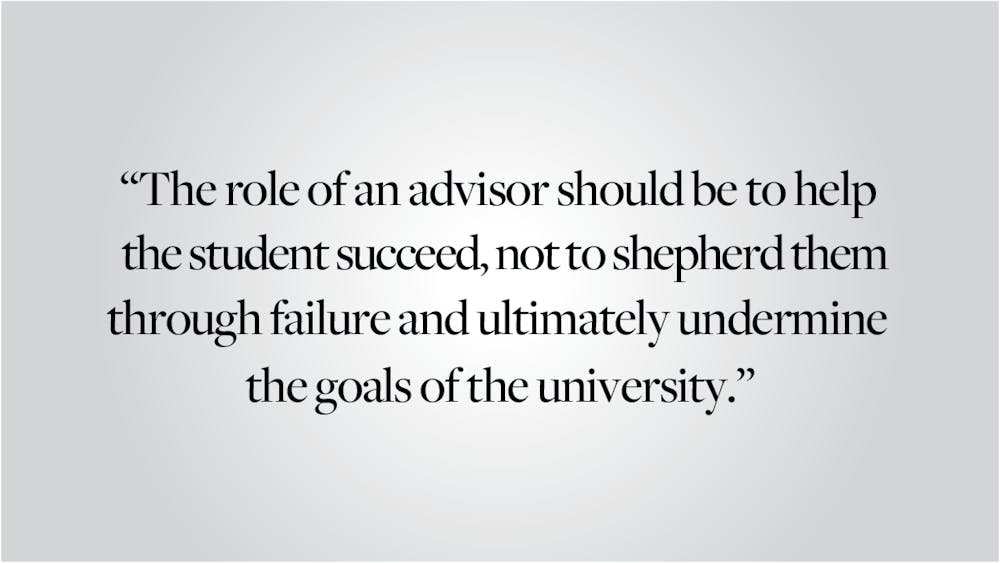Over 30 years teaching at Brown, I have had the privilege of working with many talented students who have thrived through difficult academic challenges and gone on to wonderful careers in academia and the professional world. But, for a few years now, I have been noticing a deterioration in the quality of some academic programs, which I fear will impact the ability of Brown’s alums to succeed. While there are many factors contributing to this, like general grade inflation and the mental health impacts of the COVID-19 pandemic, I suspect there is another contributing factor: Brown’s grading system and advising culture.
Grading is sometimes maligned as an unnecessary and punitive structure which serves only to limit students’ senses of learning and accomplishment, but the truth is more complicated. A fair and effective grading system provides both a meaningful incentive for students to put forth their best efforts and a useful barometer that professors and deans may use to monitor student performance. For these benefits to be realized, universities must challenge their students to elicit the best out of them. Currently, the grading system at Brown interferes with this goal and interrupts our ability to educate the next generation.
The lowest grade given at Brown is “no credit” — a failing grade, but one which does not appear on students’ official transcripts. Omitting failed classes lets students hide instances of underperformance and essentially mislead employers and graduate schools about their successes and failures at Brown. Moreover, this invisibility has created a perverse incentive. Students could in theory intentionally fail a class rather than take a better but conspicuous C. Worse yet, this could lead some advisors to encourage this practice, helping students to wipe clean their files rather than improve in their classes. Advising plays a key role in an undergraduate education, but the role of an advisor should be to help the student succeed, not to shepherd them through failure and ultimately undermine the goals of the university.
To combat this, faculty chairs should keep a watchful eye on the quality and rigor of grading in their departments. Without imposing strict quotas, efforts should be made to level out the grading curves of the classes that are most responsible for grade inflation — specifically, those in which a disproportionate percentage of students are graded with As when compared with the University or department norms. This has been attempted before: Following discussions in 2013, when I was the chair of the Department of Economics, professors in the department set out to more closely monitor their grade distributions and stymie ever-rising grade inflation. Though the enthusiasm with which this was undertaken has now faded, it certainly raised awareness of this issue and demonstrated the possibility of action.
To reinforce departmental efforts, advisors should encourage students to choose a concentration not only about which they are passionate, but also in which they can excel. We all have differing skill sets and abilities that can be applied to some fields, but not all. For example, while I would have loved to be a heart surgeon, I am blind, and I believe I did the right thing by staying away from that career.
As a long-time advisor for concentrations that combine economics with math, applied math or computer science, I have noticed how these time-intensive pathways are attracting more and more students who may not have the right skill set for them. In recent years, amid general grade inflation, I have witnessed student performances in some key concentration classes deflate, perhaps leading professors to award unearned As and Bs rather than sitting down with students and being honest about the hardships of these difficult concentrations.
Where professors are unwilling to inflate grades, I have seen students abuse the S/NC option in their courses. Although the pass-fail option is a great tool that can encourage students to explore areas far from their main interest, it should have a minimal role in concentration courses. In my experience as an instructor, the S/NC option reduces student effort, both limiting what the student can learn and damaging the class environment. As such, advisors should steer students away from invoking their pass-fail privileges in concentration courses, and instead be more honest with students about which academic path is right for them.
Given these concerning realities, the University community should enter into a much-needed discussion that addresses the grading and advising culture that is suppressing, not encouraging, student achievement.
Roberto Serrano is the Harrison S. Kravis University Professor of Economics at Brown University. He was the chair of the Economics Department from 2010 to 2014. Please send responses to this opinion to letters@browndailyherald.com and other op-eds to opinions@browndailyherald.com.





